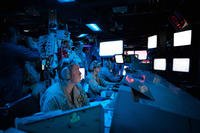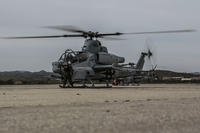TRAVIS AIR FORCE BASE, Calif. -- Master Sgt. Sean Arnold takes most things in stride, even being diagnosed with testicular cancer.
The 60th Operations Group resource manager said he's "not even remotely shy about this," cracking jokes and making puns about the life-threatening battle he's faced during the past 19 months in the most personal part of his body.
"He uses humor as a way to put a spin on a situation," said Melissa Arnold, the sergeant's wife. "He really, truly believes that everyone should feel like that's OK."
Sean first noticed something was wrong in the fall of 2012 while showering and he noticed a "hard spot" on his testicle. Then a loadmaster superintendent for the 21st Airlift Squadron, Arnold's machismo twinned with his role as a flyer, leading him to adopt a wait-and-see approach as he departed for a 3-week mission to Guam.
More than one and a half years later, it remains his most-recent flying mission.
Upon returning from Guam, Arnold said the lump grew bigger and more uncomfortable, so he called flight medicine. Within 24 hours, the then-34-year-old sergeant had an ultrasound and learned he had cancer.
As a flyer, Arnold said rather than become emotional, his coping mechanism was to "stay ahead of the jet," a chess-like approach flyers use to accept the present, but also anticipate upcoming moves. He hungered for information and whatever appointments were necessary to help him receive treatment.
In keeping with his nonchalant nature, Melissa said it wasn't even the first thing he told her when they talked on the phone that December 2012 afternoon.
Within one week of his diagnosis, Arnold had an orchiectomy to remove the infected testicle. It dulled the mood of the holiday season in the Arnold home as Christmas and the new year passed under the specter of waiting for the results of the biopsy. During this time, Arnold began a blog to chronicle his experience.
By January 2013, Arnold learned he had an aggressive form of stage 2 cancer which affects 8,000 men annually. His options for treatment included chemotherapy, which he found distasteful, or retroperitoneal lymph node surgery. The surgery slices open the patient vertically from the rib cage to the navel, nudging aside all of the major organs to allow doctors access to the lymph nodes, a favored path for cancerous cells to travel.
Arnold preferred the surgery. The cancer had started to spread along the lymph nodes, so the operation removed the existing cancerous cells and halted further growth.
The 8-hour surgery took place Feb. 8, 2013, at the University of California, Davis Medical Center, Sacramento. The operation was a success, but a grueling recovery faced Arnold. The master sergeant spent eight days in the hospital recovering, three more days than many patients in his situation.
"From the pain side, it was pretty horrible," he said. "It was a lot worse than I was expecting."
Arnold said the surgery destroyed his core muscles. Melissa said it was six months before her husband was back to normal, around which time he said he nearly returned to flying.
But then it looked like the cancer had returned.
After some tests, his blood work showed the possibility the cancer had returned. Arnold spent the next few weeks on edge, worrying about his future, while tests were done. However, the results were in the sergeant's favor. His testosterone levels were low, requiring medication for the rest of his life.
The cancer had not returned.
However, Arnold's road to recovery is not yet complete. In May 2014, he noticed a bulge near his scar from his belly-splitting surgery. The 36-year-old said his abdominal wall healed incorrectly, causing a hernia, which will require a third surgery later this month.
Still, Arnold remains upbeat and determined to return to flying status before he reaches the 20-year mark for retirement in 2016.
"It left me feeling very mortal," Arnold said. "I learned that it's OK to slow down and enjoy what I have. ... We get so mired down in our little day-to-day battles."
The experience made him an advocate for men's health. June is Men's Health Month, particularly testicular cancer, and as typical of his humorous approach to his fight, a number of his blog entries end with a call to men to "check your junk."




























